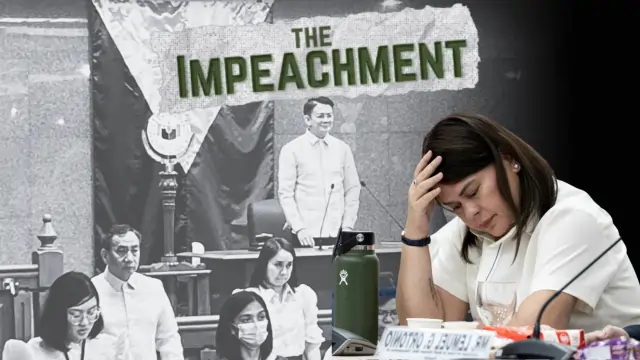Senator Bato dela Rosa’s bid to dismiss Sara Duterte impeachment has triggered legal controversy and political tension. Is this a tactical move to protect the Vice President, or a constitutional crisis in the making?

The Attempt to Shut Down the Sara Duterte Impeachment
As the Philippine Senate inches closer to its most high-stakes trial in recent history, a political bombshell has been dropped: Senator Ronald “Bato” dela Rosa filed a resolution seeking the outright dismissal of the Sara Duterte impeachment case. With just weeks left before Congress adjourns, this unexpected move has left the nation on edge, raising serious questions about the integrity of the law, political loyalty, and democratic accountability.
Senator dela Rosa claims that the 100-day constitutional deadline for the Senate to act on the Sara Duterte impeachment has expired, making the case “moot and academic.” But is it really that simple—or is this a calculated attempt to shield one of the most powerful figures in the country?
The Charges Behind the Impeachment
The Sara Duterte impeachment stems from a set of grave allegations that rocked the administration earlier this year. In February, the House of Representatives approved the Articles of Impeachment against Vice President Sara Duterte, charging her with:
- Corruption and misuse of public funds
- Betrayal of public trust
- Alleged involvement in a destabilization plot aimed at undermining President Ferdinand Marcos Jr.
The political implications of these charges are massive. If proven true, they would not only jeopardize Duterte’s political future but also expose deeper divisions and vulnerabilities within the highest levels of government.
The Resolution: Dismissal or Evasion?
Senator Bato dela Rosa’s resolution suggests that the Senate has already failed its constitutional duty by not initiating the trial within the 100-day limit. According to him, this delay invalidates the process and, therefore, the case should be thrown out altogether.
But prominent constitutional experts and former public officials argue otherwise. Atty. Christian Monsod, one of the framers of the 1987 Constitution, has publicly criticized the resolution, calling it “a dangerous maneuver” that undermines the very purpose of checks and balances in a democratic government.
According to Monsod, while there is a timeline mentioned in the Constitution, it does not nullify the Senate’s obligation to conduct an impeachment trial once Articles of Impeachment are transmitted from the House. Ignoring the case, he warns, would violate the spirit—and potentially the letter—of the law.
Political Tensions: Marcos vs Duterte
The Sara Duterte impeachment is not occurring in a vacuum. It’s part of a much larger and increasingly volatile power struggle between the Marcos and Duterte camps.
Relations between President Marcos Jr. and Vice President Duterte have been strained, especially following international developments such as the International Criminal Court’s (ICC) issuance of an arrest warrant for former President Rodrigo Duterte over alleged crimes against humanity. The younger Duterte has publicly criticized the ICC and even hinted at political persecution.
Now, the Sara Duterte impeachment case is further polarizing these two political dynasties. Allies of Sara Duterte, including Bato dela Rosa, argue that the impeachment is politically motivated, while pro-Marcos legislators insist that no one is above the law.
Senate President Escudero’s Role in Sara Duterte Impeachment
Amid this political storm, Senate President Francis “Chiz” Escudero has tried to maintain a neutral stance. He recently confirmed that the Articles of Impeachment will be formally read in the Senate on June 11, 2025, signaling the possibility of trial proceedings—if the motion to dismiss doesn’t derail them.
Escudero is walking a tightrope. On one hand, he must respect the Senate’s constitutional mandate to hold an impeachment trial. On the other hand, internal politics and the influence of Duterte-aligned senators could pressure the chamber to favor dismissal.

The Clock Is Ticking: June 30 Deadline Looms
With the 19th Congress set to adjourn on June 30, time is a critical factor. If the Senate does not act swiftly and transparently, the case risks being buried not by legal grounds but by legislative inertia.
This has raised concerns among the public and watchdog organizations, who argue that justice delayed is justice denied. Several law professors from the University of the Philippines, along with civil society groups, have urged the Senate to begin the trial and allow the evidence to speak for itself.
“Let the trial happen,” one faculty statement read. “If the charges are baseless, let the truth come out in open court. But don’t dismiss it in silence.”
What’s at Stake for Sara Duterte?
For Vice President Sara Duterte, the stakes couldn’t be higher. If the impeachment trial proceeds and the Senate finds her guilty, she would be removed from office, effectively ending her political career just as speculation about her 2028 presidential bid begins to heat up.
A dismissal, however, would embolden her position—and her base. Already, Duterte has signaled confidence that any trial conducted under a future Congress would be invalid, framing the impeachment as nothing more than a political witch hunt.
But her opponents see the resolution to dismiss the case as a “get out of jail free card” enabled by loyalists within the legislative branch.
Is the Senate Dodging Accountability?
At the heart of this entire drama is a deeper issue: Is the Senate truly acting in the interest of justice, or is it maneuvering to protect political allies?
The Constitution empowers the Senate to act as the court of impeachment. That role demands impartiality, transparency, and a commitment to the rule of law. Dismissing the Sara Duterte impeachment on technical grounds, without allowing a public trial, risks eroding public trust, not only in the Senate, but in the broader institutions of governance.
This is not just about one woman or one office. It’s about whether the Philippine government will hold its leaders accountable, regardless of name, position, or influence.
Conclusion: A Defining Moment for Philippine Democracy
As the nation waits for June 11, all eyes are on the Senate. The outcome of this impeachment saga will serve as a litmus test for how far the Philippines has come in institutional maturity—and how much farther it still needs to go.
The Sara Duterte impeachment isn’t just a legal matter. It’s a story of power, accountability, and the future of the republic. Whether the trial proceeds or the case is dismissed, the implications will reverberate far beyond the halls of Congress and into the hearts and minds of the Filipino people.
Will the Senate rise to the occasion? Or will it fold under political pressure?
Only time and courage will tell.
Follow us for more!
